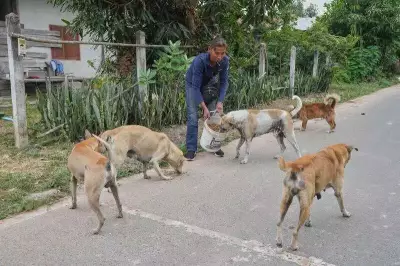
Pune Citizens Stage Peaceful Protest Against Supreme Court's Dog Removal Order
Hundreds of Pune residents gathered in a powerful demonstration on Saturday evening, voicing strong opposition to the Supreme Court's recent interim order concerning community dogs. The protest, organized under the banner "Pune Rises for the Animals," saw animal welfare activists, students, and NGO volunteers assemble at Pune Camp to challenge the directive issued by the apex court on November 7.
Voices from the Ground: An Unheard Community
Participants at the rally expressed a deep sense of being overlooked. Mariam Abuhaideri, an activist involved in organizing the event, stated that the court passed its order without granting a hearing to the very NGOs and volunteers who work closely with animal welfare. She highlighted the constitutional concerns, pointing out that the ruling appears to contradict the Animal Birth Control (ABC) Rules of 2023.
"The Supreme Court issued interim orders without hearing from the animal-loving community," Abuhaideri told reporters. She emphasized that the established ABC process—which involves sterilizing, vaccinating, and returning dogs to their original territories—is a globally recognized and scientifically backed method for managing street dog populations humanely.
Another protester, who wished to remain anonymous, shared an emotional perspective, fearing the order would sever the long-standing bonds between neighborhoods and the dogs they have cared for. "These dogs have protected our lanes for years. We have raised their puppies, vaccinated them, and fed them from our own pockets," she said, calling the sudden labeling of these animals as a threat deeply unjust.
A Structural Problem, Not a Canine One
While the protest focused on the court's ruling, Meher D'Arcy, a former animal welfare officer, identified the root of the issue as systemic. She explained that the problem is not with the dogs or the ABC program's design, but with its chronic underfunding and political interference, particularly concerning dog relocation.
"The problem is structural, financial, and not municipal," D'Arcy asserted. She revealed that in Pune, municipal budgets allocated for sterilisation are so meager that they only cover about 10% of the community dog population. This inadequacy leads to unchecked reproduction and perpetuates the cycle.
D'Arcy also questioned the feasibility of the court's directive to remove dogs from vast public spaces and fence off bus stops. "Just imagine the scale, thousands of bus stops, lakhs of dogs, and no space, no staff, no funds," she noted, describing the order as a "knee-jerk reaction" that is simply not implementable without causing disease and chaos in overcrowded shelters.
A Call for Coexistence and Sustainable Solutions
The protesters united in a clear demand for holistic, compassionate solutions over removal. Their charter included calls for strict anti-cruelty enforcement, expansive mass sterilisation drives, regulation of illegal breeding, and government incentives to promote pet adoption—measures successfully implemented in nations like Bhutan and the Netherlands.
They also advocated for practical measures such as the introduction of microchipping and licensing systems for dogs living within institutional premises, which would ensure proper vaccination tracking and owner accountability. The rally concluded with a resonant plea for "coexistence over cruelty," as activists vowed to continue their fight through legal channels and public awareness campaigns.





